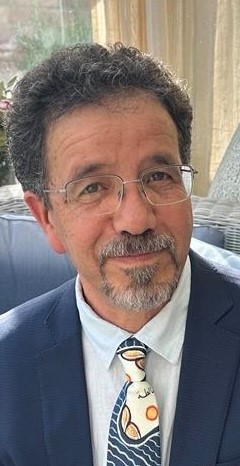Mohamed-Salah Omri
Position:
Professor of Arabic and Comparative Literature
Faculty / College Address:
Faculty of Asian and Middle Eastern Studies / St John's College
Email:
mohamed-salah.omri@ames.ox.ac.uk
Research Interests:
Key research interests include modern and pre-modern Arabic literature; Francophone literature of the Maghreb; Comparative and world Literatures; literature and history; cultural politics; Tunisian culture and society.
Courses Taught:
Teaching includes the papers:
- Arabic literature core papers
- Arabic literature and nationalism
- Introduction to Arab literary and image culture
- Arabic narratives of modernity
- Arabic short story
Recent Publications:
Selected Books
- 2022 Co-editor with Philippe Roussin, Literature, Democratic and Transitional Justice: Comparative World Perspectives, (Cambridge: Legenda Books), 294 pp, ISBN: 978-1-781883-74-7.
- 2017 Co-editor with Nicola Gardini, Adrian X. Jacobs, Ben Morgen, and Matthew Reynolds, Minding Borders: Resilient Divisions in Literature, the Body and the Academy, (Cambridge: Legenda), 240 pp. ISBN: 978-1-781883-66-2.
- 2016 Co-editor with Mohsen El Khouni and Mouldi Guessoumi, University and society in the context of Arab revolutions and new humanism, (Tunis: Rosa Luxembourg Foundation), 300 pp. ISBN: 978-9938-14-987-6.
- 2016 Confluency (tarafud) between trade unionism, culture and revolution in Tunisia (Tunis: UGTT information and documentation unit). ISBN 978-9938-14-374-4. Review: http://www.tandfonline.com/doi/pdf/10.1080/13629387.2016.1225791?needAcc...
- 2015 Co-Editor with Matthew Reynolds, Ben Morgan and Celine Sabiron, Special issue, Comparative Criticism and Methods in Comparative Critical Studies 12:2 (2015)
- 2010 Co-editor with Maria Fusaro and Colin Heywood. Trade and cultural exchange in the early Modern Mediterranean: Braudel’s maritime legacy (London: I.B. Tauris), 340 pp. reviews: http://www.history.org.uk/resources/general_resource_4005_73.html
http://www.tandfonline.com/doi/abs/10.1080/09518967.2014.963337 - 2007 Guest Editor, The Novelization of Islamic Literatures: the intersections of Western, Arabic, Persian, Urdu and Turkish Traditions in Comparative Critical Studies, 4:3.
- 2006 Nationalism, Islam and World Literature: sites of confluence in the writings of Mahmud al-Mas’adi (London and New York: Routledge), 192 pp. (Review: William Granara, Middle Eastern Literatures, 12, 2, 2009: pp. 2-5) (http://www.tandfonline.com/doi/abs/10.1080/14752620902951256).
Selected articles and chapters in books
- “Tunisian literature and the language question: the long view of a recurring debate” (2024). Open access https://www.euppublishing.com/doi/full/10.3366/ccs.2024.0519
- 2021 “North Africa: An Introduction” in A Companion to African Literatures, ed. Olakunle George, Wiley, 2021, 103- 115.
- 2021 «Représenter la méditerranée moderne dans l’Afrique du nord contemporaine » in Echanges culturels et commerciaux dans la méditerranée moderne : l’héritage maritime de Fernand Braudel, eds. Maria Fusaro, Colin Heywood and Mohamed-Salah Omri, trans. Daniel Verhyde, Presses universitaires Septentrion, 2021, 321-342. Read the original (in English) here.
- 2020 “Representations of History in Times of Revolution” in On History and Memory in Arab Literature and Western Poetics, eds. Bioutheina Majoul and Yosra Amraoui, Cambridge Scholars Publishing, 2020, 12-28.
- 2019 « Écriture et liberté en Tunisie: une justice (poétique) transitionnelle » (in French) in Escribir la democracia. Literatura y transiciones democráticas (siglos XX- XXI), eds. Anne-Laure Bonvalot, Agnès Delage, Anne-Laure Rebreyend and Philippe Roussin, Presses de la Casa de Velazquez, 247-258.
- 2017 in «Justice (poétique) transitionnelle: écriture et démocratisation en Tunisie » in Littératures et transitions démocratiques (Madrid: Casa Valesquez).
- 2016 “Humanism in times of torture” in University and society in the context of Arab revolutions and new humanism, (edits. Mohsen El Khouni, Mouldi Guessoumi and Mohamed-Salah Omri (Tunis: Rosa Luxembourg Foundation), 105-120.
- 2015 “Min ajl nadhariyah fi al-tarafud al-adabi” (Towards a theory of literary confluency) in The comparative lesson and the dialogue of literatures (Tunis: Bayt al Hikma), 13-52. ISBN: 978-9973-49-159-6.
- 2012 “The movement Perspectives: Legacies and representations”, EuroOrient, vol. 38 (2012), 149-164.
- 2012 “A Revolution of Dignity and Poetry”, boundary 2, 39: 1 (2012) (137-166).
- 2011 “Notes on the Traffic between Theory and Arabic Literature”, International Journal of Middle East Studies. Roundtable: Arabic literature and literary theory., 43 (2011), 731-733.
- 2010 “Representing the Early-modern Mediterranean in Contemporary North Africa” in Maria Fusaro, Colin Heywood and Mohamed-Salah Omri, eds. Trade and Cultural exchange in the early Modern Mediterranean: Braudel’s maritime legacy. (London: I.B. Tauris), 279-298.
- 2010 “Abu al-Qasim al-Shabbi” in Essays in Arabic Literary Biography, 1850-1950. Ed. Roger Allen (Wiesbaden: Harrassowitz Verlag), 292-303.
- 2008 “Local Narrative Form and the Construction of the Arabic Novel”, Novel 41 (Spring/Summer 2008), 244-263.
- 2006 “Voicing a Culture ‘Dispersed by Time’: Metropolitan Location and Identity in the Art and Literature of Sabiha al Khemir” in Arab Voices in Diaspora, eds. Ian Netton and Zahia Salhi. (London and New York: Routledge), 53-75.
- 2005 “Literature, History and Settler Colonialism in North Africa,” Modern Language Quarterly, 66.3, 273-298.
- 2003 “Evocation and Mimesis: al-Muwaylihi, al-Mas’adi and the Narrative Tradition,” Edebiyat, 14 (1-2), 57-79.
- 2003 “Collective Memory and Representation in Tunisian Literature” in Francophone Post-Colonial Cultures: Critical Essays, ed. Salhi, Kamal (Lanham, Maryland: Lexington Books), 52-63.
- 2000 “Adab in the Seventeenth Century: Narrative and Parody in al-Shirbini’s Hazz al-Quhuf,” Edebiyat, 11: 2, 169-196.
- 2000 “Memory and Representation in Mellah’s Novels,” International Journal of Francophone Studies. 3:1, 33-41.
- 1998 “‘There is a Jahiz for Every Age’: Narrative Construction and Intertextuality in al-Hamadhani’s Maqamat,” Arabic and Middle Eastern Literatures 1, 31-46.
Omri was Chair of the Committee on comparative histories of Islamic literatures, a research committee of the International Comparative Literature Association (ICLA). (2016 - ); founding member of Oxford Comparative Criticism and Translation (Website: http://www.occt.ox.ac.uk/) (2014 - ); founding member of the project Arab Revolutions and New Humanism, and interdisciplinary programme in collaboration with universities in Tunis and the US (2013 - ) funded in part by Rosa Luxemburg Foundation; member, research network on Literature and democracy (xix- xxi centuries), theoretical, historical and comparative approaches, funded by CNRS, France and directed by Philippe Roussin (2016 - 2020). Research for Omri’s present book project has been supported by Leverhulme Research Fellowship for 2015-2016.
Omri is also a frequent commentator on Tunisia in Anglophone and Arab media.
Personal Webpage
Nationalism, Islam and Worldliterature
Trade and Cultural Exchange in the Mediterranean
A Revolution of Dignity and Poetry




